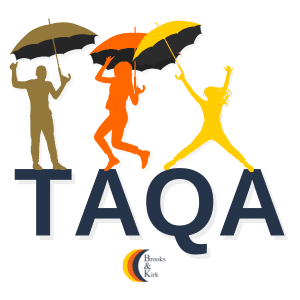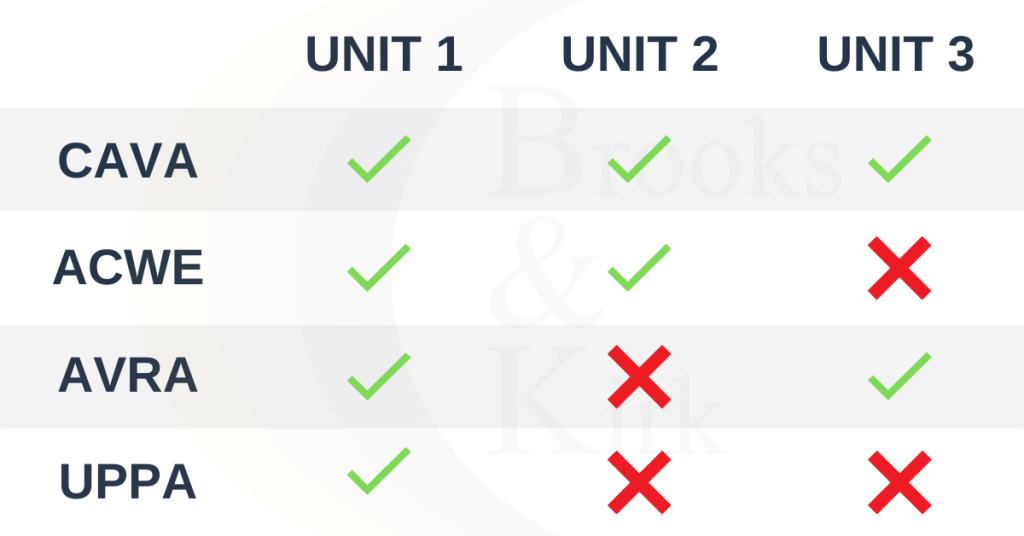What is TAQA?

Actually, TAQA is more of an umbrella term for a suite of qualifications. TAQA is an acronym, which stands for Training, Assessment, and Quality Assurance. But it’s not a course itself.
In this post, we’ll go through each of these qualifications in the TAQA suite and who they’re for. Most commonly, people who are looking for a TAQA qualification are wanting to become an assessor. If this is you, you’ll need the assessor qualifications.
T = Training
Education and Training Qualifications in TAQA
The first letter of the TAQA acronym stands for Training. Training qualifications in the TAQA suite are for those who want to start teaching/tutoring adults, in their industry of expertise.
Under the Training section of this suite, we have the Education and Training qualifications. They used to be part of the Teaching in the Lifelong Learning Sector qualifications.
Level 3 Award in Education and Training (AET)
This AET was formerly known as PTLLS. This is the qualification you will need if you are looking at getting into teaching or training adults in your industry. For example, at colleges. This is a ‘foot in the door’ qualification so to speak, so you don’t need to already be in a teaching role.
A = Assessment
Assessor Qualifications in TAQA
Under the Assessment section of the TAQA acronym, we have four Assessor qualifications. They are CAVA, ACWE, AVRA and UPPA.
Each qualification holds it own purpose, as they all have a different combination of the following three units:
- Unit 1: Understanding the Principles and Practices of Assessment
- Unit 2: Assess Occupational Competence in the Work Environment
- and finally, Unit 3: Assess Vocational Skills, Knowledge and Understanding
It is only when you take all three units (in the CAVA qualification) that you become a fully qualified Assessor. The other combinations seen in the UPPA, AVRA, and ACWE awards qualify you to do part of the role of a fully trained Assessor.
Each course description below explains what it qualifies you to do.
UPPA – Level 3 Award in Understanding the Principles and Practices of Assessment (Unit 1)
This award is theory only, and that means it doesn’t qualify you to practice as an assessor. Its purpose is to refresh the knowledge of Assessors who are already qualified. For example, if you currently hold the A1 assessor qualification or the D32/33 assessor qualification. The UPPA course teaches you all about the roles and responsibilities of an Assessor.
AVRA – Level 3 Award in Assessing Vocationally Related Achievement (Units 1 and 3)
This award qualifies you as Assessor in classroom, workshop or virtual learning settings only. It doesn’t qualify the learner to assess in a workplace environment.
ACWE – Level 3 Award in Assessing Competence in the Work Environment (Units 1 and 2)
On the other hand, we have ACWE which qualifies you to become an Assessor in a workplace setting. But, as you may have guessed it, not in a classroom, workshop or virtual environment.
CAVA – Level 3 Certificate in Assessing Vocational Achievement (Units 1, 2 and 3)
If you need or want to assess in a learning environment and in the workplace, then the CAVA qualification is for you. This CAVA qualification is the most sought after in the TAQA suite. It qualifies you to become an NVQ Assessor, Apprenticeship Assessor (End-Point Assessor), and an On-Programme Assessor. Often in job descriptions, employers ask their candidates to hold a ‘TAQA qualification’ – 9 times out of 10, this is what they are referring to.
QA = Quality Assurance
IQA Qualifications in TAQA
Finally, under the Quality Assurance section of TAQA, we have the IQA qualifications.
The IQA qualifications are ‘Level 4’ instead of ‘Level 3’. This means they represent a higher level of learning than the Assessor courses. The role of an IQA is a step up from the role of an assessor.
Just like the assessor qualifications, each IQA qualification is made up of a combination of three units:
- Unit 1: Understanding the Principles and Practices of Internally Assuring the Quality of Assessment
- Unit 2: Internally Assure the Quality of Assessment
- and finally, Unit 3: Plan, Allocate and Monitor Work in Own Area of Responsibility
Level 4 Award in Understanding the Internal Quality Assurance of Assessment Processes and Practice (Unit 1)
This is another theory-only course and does not qualify you to become an Internal Quality Assurer. Instead, it’s a great form of professional development for staff already in the industry, and also managers.
Level 4 Award in the Internal Quality Assurance of Assessment Processes and Practice (Units 1 and 2)
This course qualifies you to become an Internal Quality Assurer. This qualification is closest to the old Internal Verifier qualification. As an IQA, you will be conducting quality assurance for assessment and assessment decisions. However, if you are interested in managing the entire quality assurance process, then you will need…
Level 4 Certificate in Leading the Internal Quality Assurance of Assessment Processes and Practice (Units 1, 2 and 3)
Finally, we have the Lead IQA course. In this qualification, you will cover all three units. The Lead IQA qualifies you not only to quality assure assessments and assessment decisions, but also to manage internal quality procedures and staff. It also qualifies you to coordinate with External Quality Assurers.
NVQAssessor.org wrote a great blog on what you need to know to become an IQA / Lead IQA, if this is a role that interests you.
What is TAQA?
Remember: TAQA is a suite of qualifications and is not a qualification itself. It stands for Training, Assessment and Quality Assurance.
If you want more information about the courses that form TAQA, contact us today. We’ll be more than happy to help answer any questions or queries you have.
Steve is a Chartered Manager and a Fellow of the Chartered Management Institute.
He provides Educational Consultancy to the 19+ sector as well as being an Assessor, IQA, EPA and Digital Marketing Professional. When not doing any of these he finds time, every now and then, to write blogs and articles.




